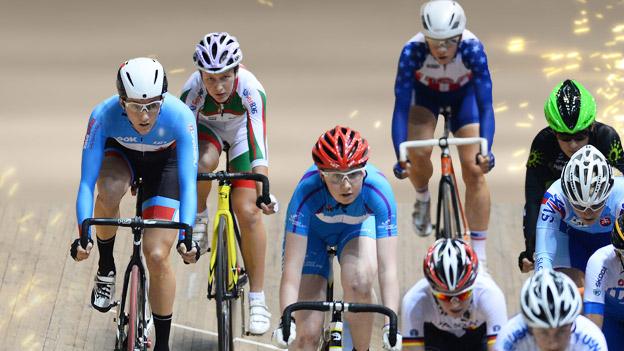Doping in cycling: Why are the amateurs 'emulating the pros'?
- Published
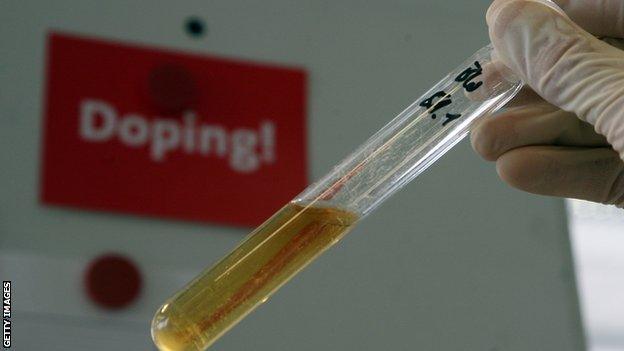
With resources tight, the vast majority of anti-doping efforts are focused at the elite end - does that mean amateurs are getting away with it?
By Matt Slater, BBC Sport |
It was cold, grey and very wet when 6,000 amateurs rolled out of Leeds' Roundhay Park last week to pedal up the same hills, and dash down the same dales, as Sir Bradley Wiggins had done in that afternoon's Tour de Yorkshire finale.
As the weekend wheelers got closer to the finish, and the sun burnt off the mist and moisture, their efforts were raucously cheered by swelling crowds along the roadside, particularly on the all-too-frequent climbs.
What started as a strange way to spend a day off had become the closest these dreamers would get to parting waves of fans in the Alps or sprinting for King of the Mountains points in the Pyrenees.
Being able to benchmark yourself against your heroes and play at being a pro is a significant part of cycling's charm and a factor in its rising popularity. It is not like you get to play at Lord's, Old Trafford or Twickenham very often, is it?
But the pretence can go too far.
Professional cycling's drug habit has been well documented, most recently in a report published in March by the sport's governing body, the International Cycling Union (UCI).
Written by independent experts and based on a year's worth of interviews with senior figures from the sport, the Cycling Independent Reform Commission, external (Circ) investigation tried to answer why cycling had got into such a mess, what role the leadership played in that moral collapse and if the likes of Lance Armstrong could have been caught sooner.
Whether we got any closer to answering those questions is debatable, but the report was certainly successful in throwing up new controversies, none more so than the suggestion that keen amateurs are not just aping the dietary fads, equipment choices and training methods of the stars, some are taking the same shortcuts as the riders who have cheated in professional cycling.
UCI President Brian Cookson 'shocked' by doping report
"The commission believes doping in amateur cycling is becoming endemic," the report said.
"This was confirmed by amateur riders, as well as professionals, managers and anti-doping personnel who had exposure to it.
"It has been caused by a combination of ease of access to drugs via gyms and the internet, the reduction in costs, a spread of knowledge in means and methods of administration, and a lack of funding for regular testing at the amateur level."
Circ's authors continued by outlining a depressing scene where amateurs sell doping products to pros, and vice-versa, "middle-aged businessmen" charge up on cocktails of prescription drugs to win age-group races, and cheating is now rife in youth cycling as nobody has the resources to police the sport that far down the ladder.
"Some professional riders explained they no longer ride in the gran fondos [timed, long-distance amateur races on closed roads] because they were so competitive due to the number of riders doping," the report stated.
UCI president Brian Cookson, the man who commissioned the report, was quick to address this new front in the war against cheats, saying he wanted to look at it "with a bit more seriousness" and that grooming youngsters to dope was "nothing short of child abuse".
He is right to say that more needs to be known about the scale of the problem, but he knows from his time in charge of British cycling that it is definitely happening.
Speaking at an anti-doping conference in London a fortnight later, Cookson recalled two doping cases involving amateurs that British Cycling and UK Anti-Doping teamed up on. He also reiterated his total amazement that anybody would do such a thing.
But is it really so shocking?
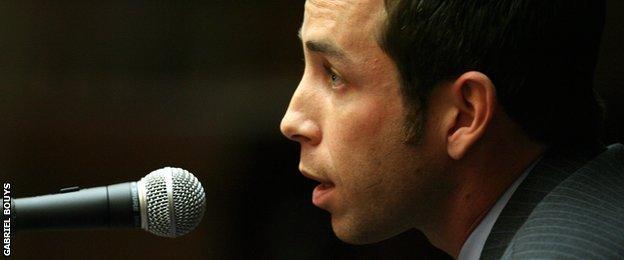
US journeyman pro Joe Papp testified against disgraced Tour de France champion Floyd Landis in 2007 at the same time as he was running an illegal online drugstore for endurance athletes
As a rider, Joe Papp , externalwas not quite good enough to break into the sport's global elite but he made a living and travelled the world racing on his bike for most of the late 1990s and early noughties.
But that all came to an abrupt end in 2006 - the American's best year in terms of results - when he was caught doping at the Tour of Turkey. He was banned for two years and lost his results going back to 2001.
Nothing remarkable about that for cycling, you might say, but it is what Papp did next that was unusual.
Despite cooperating with the US anti-doping authorities in their case against former Tour de France champion Floyd Landis,, external Papp set up a website in September 2006 to sell the blood-boosting drug EPO and human growth hormone direct from a factory in China.
That scam ran for a year until he was rumbled for that, too, but not before he had made close to £60,000 selling drugs to almost 200 clients in Australia, Europe and North America. And of those customers almost three quarters were amateurs, mainly cyclists.
"I think it's understandable but that doesn't mean it's rational," said Papp, an intelligent and engaging man. "Cheating is endemic in our society.
"It is crazy that people are willing to put these dangerous pharmaceuticals into their body when there's nothing at stake - so in that sense it's surprising - but at the same time it doesn't really shock me."
Papp got his business started with a few posts on cycling forums and word-of-mouth marketing did the rest. He advised his customers to get medical advice, told them to guard their anonymity and warned them that what they were doing was against the rules.
The secret to his success, if that is the right word, was that he sold 'good' stuff at low, low prices.
"You could buy enough EPO to last a season for [£1,000]. When you think that a pair of carbon-fibre racing wheels can cost [£2,000], the cost of EPO wasn't really a limiting factor," he explained.
"I remember what struck me about many of my clients was how excited, almost giddy, they were to finally have the opportunity to find out how far they could push their bodies.
"Emulating the pro lifestyle included doping for many of them."
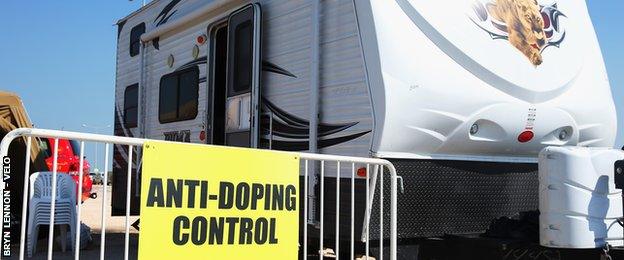
There is not enough money for even rudimentary drug-testing at most amateur events, which is why the authorities rely on intelligence and whistle-blowers
Papp pleaded guilty in 2010 to two counts of conspiracy to traffic drugs and was sentenced to six months of house arrest. He was also given an eight-year sports ban , externalthat would have been worse if he did not offer the authorities meaningful assistance.
The United States Anti-Doping Agency (Usada) certainly found the information Papp gave useful. In the years since he received his first ban for doping, Usada has sanctioned 68 people, external with suspensions and bans from cycling, but barely a dozen of those are recognisable names.
The rest are semi-pros at best, with most of them being successful amateurs.
Among them are the two riders who won their respective age groups at the Gran Fondo New York in 2012, as well as a 62-year-old caught cheating at the US Masters Road Championships and a 51-year-old caught twice in two years.
Somebody has obviously filled the gap in the market Papp vacated, as he shipped his last package in 2007, but it is also clear that customers have not been frightened off.
"For the person who is willing to do it, and they're not scared by the medical side of it or getting caught, it just becomes another tool in the toolbox," said Papp.
"Obviously there are people, and I knew some, who would never do it because it was against their ethics, and whatever pleasure they derived from sport would be compromised. But for those who didn't have that moral condition it became pretty clinical."
If you think this is a uniquely American problem, think again. As mentioned earlier, Cookson could recall at least two cases on his watch, one of those being a former associate of Papp's.
Dan Staite was target-tested by UK Anti-Doping in 2010 after a string of seemingly impressive results in British amateur and semi-pro races. He refused to take a blood test and was given a two-year ban., external
That sanction has expired now but he has not returned to cycling. I asked him for an interview but he politely declined, saying only that he is not proud of what he did and wants to put it behind him.
Jason White was another I asked for an interview without success. The Essex-based businessman was once the top-ranked amateur in the country but his achievements look less impressive now he is serving a two-year ban for refusing a test., external
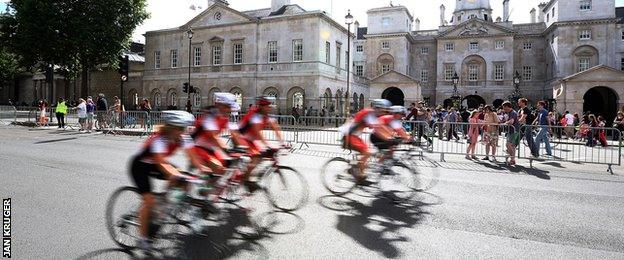
Hours before the pros race on the same course, riders whizz down Whitehall during a large sportive event in London
But I did speak to one veteran of the British time-trial scene whose name appeared on Papp's database. He denied any knowledge of how that happened or of ever using banned substances. He also said he had never been drug-tested in this country. There must be an innocent explanation to his email being on Papp's customer list, then.
Of course, none of this explains why people whose livelihoods do not depend on their results are willing to spend not insignificant sums of money on potentially dangerous drugs.
Michael Shermer, external is a former pro rider and cycling campaigner who has spent the last 30 years building a reputation as one of America's most original voices on issues related to science and superstition.
Debunking pseudoscience is his speciality but Shermer has also written widely about cycling's doping crisis,, external an area rich in bogus theorising and claims of supernatural performance.
He is not remotely surprised that some amateurs take extreme measures for such small financial rewards; if anything, he is surprised that anybody is surprised.
"Ego, honour, status, hierarchy - aka 'bragging rights' - are just as powerful motivations for humans as financial rewards, and in many cases even stronger," said Shermer.
"We are highly motivated by psychological factors related to where we stand in comparison to other humans. Sport brings this out in spades, especially for high-testosterone men, which cycling seems to attract.
"To be able to take the climb in a group ride can mean a lot to a guy, even if it is just the local club or regional race.
"The swelling pride of winning is the result of our dopaminergic neurons releasing dopamine - the 'reward' molecule related to learning, gambling, drug addiction and so on that gives us a burst of pleasure - and that can be as motivating, and sometimes even more motivating, than money."
That does not make it right, though, and all sports must resist man's basest instincts and provide a forum for our purest.
"I feel profoundly dirty for doing what I did," said Papp.
"I didn't start the problem but I changed the model, and making doping more accessible is something I'll regret forever."
- Published8 March 2015
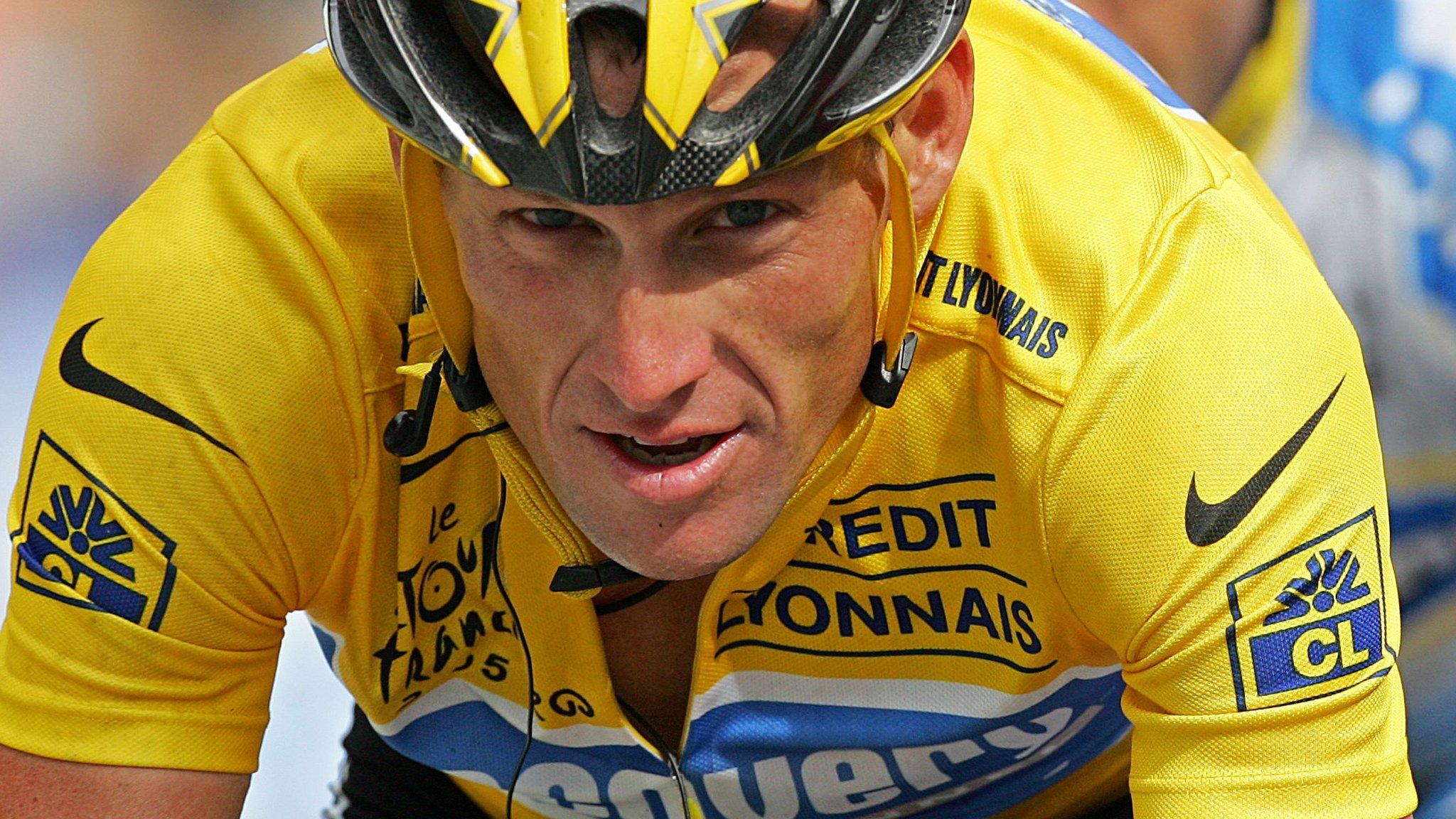
- Published8 March 2015
- Published4 September 2014
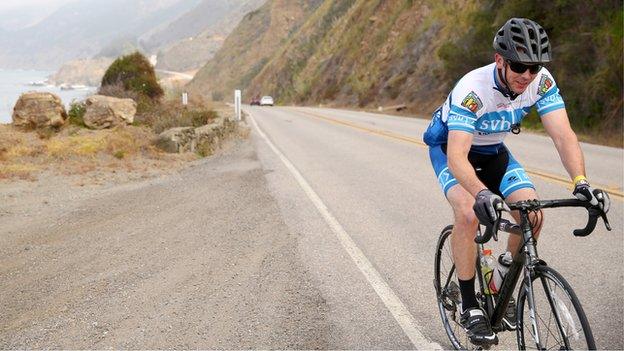
- Published19 July 2013
